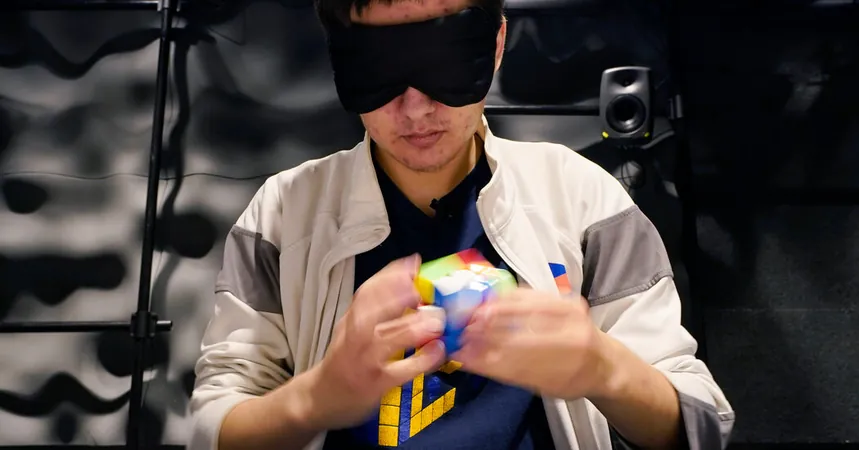
Shocking Discovery: Human Brain Processes Information Slower than Your Internet Connection!
2024-12-29
Author: Ling
Shocking Discovery: Human Brain Processes Information Slower than Your Internet Connection!
In a world where a slow internet connection can drive us to distraction, a recent study reveals that our brains lag far behind the digital speeds we're accustomed to. While your internet might race ahead at lightning-fast speeds—averaging about 262 million bits per second (bps) in a typical American home—researchers at Caltech have placed the human brain's information flow at a staggering 10 bps. Yes, you read that right, just 10 bps!
Published this month in the journal *Neuron*, the study is provocatively titled "The Unbearable Slowness of Being.” Lead researcher Markus Meister, a neuroscientist at the California Institute of Technology, aimed to challenge the glorified perception of brain complexity. “It's a bit of a counterweight to the endless hyperbole about how incredibly complex and powerful the human brain is. If you actually try to put numbers to it, we are incredibly slow,” he explained.
This groundbreaking study emerged from a desire to quantify how quickly information traverses the nervous system, a topic that had strangely gone unexamined. Meister's investigation began while teaching a neuroscience class, where he realized that there were no hard numbers to refer to regarding the flow rate of information within the brain.
Using typing as a benchmark, researchers analyzed a massive dataset of 136 million keystrokes from 168,000 individuals. The results? The average typing speed was found to be about 51 words per minute, translating to an information flow of only 10 bits per second. Some might think the rapid motions of world-class gamers would yield higher figures, but surprisingly, even they clocked in at the same 10 bps rate.
To explore further, Meister and graduate student Jieyu Zheng examined feats that don’t rely solely on physical dexterity, such as speedcubing—solving a Rubik's Cube blindfolded. Record-setting cuber Tommy Cherry took just 5.5 seconds to inspect his cube before solving it in 7.5 seconds, clocking in an information flow of merely 11.8 bps. Even exceptional memory athletes, such as Mongolian champion Munkhshur Narmandakh, demonstrated low rates of information flow during the intense 5 Minute Binary memory game, achieving just 4.9 bps.
This raises a tantalizing question: Why does the human brain process so much sensory input yet retain so little? Dr. Meister noted that our exceptionally high number of photoreceptor cells can transmit an astonishing 1.6 billion bps, meaning we filter out about one bit from every 100 million received. It's a perplexing shortfall that begs for further investigation into our cognitive processing capabilities.
While critics like Britton Sauerbrei from Case Western Reserve University argue that the study may overlook unconscious processes crucial for basic functioning, he concedes that in terms of conscious tasks and memory, the data supporting slow cognitive processing is compelling.
As the research community looks to the future, some scientists, like Martin Wiener from George Mason University, suggest that a comparison of human information flow with other species could yield riveting insights. Just how do our brains stack up against those of flying insects known for split-second decisions? Could we find some species operating on even slower rates?
As technology advances and our digital lives flourish, this study serves as a stark reminder of the limitations of our biological hardware. Could understanding this “information bottleneck” revolutionize the way we approach cognitive tasks? Only time (and more research) will tell!

 Brasil (PT)
Brasil (PT)
 Canada (EN)
Canada (EN)
 Chile (ES)
Chile (ES)
 Česko (CS)
Česko (CS)
 대한민국 (KO)
대한민국 (KO)
 España (ES)
España (ES)
 France (FR)
France (FR)
 Hong Kong (EN)
Hong Kong (EN)
 Italia (IT)
Italia (IT)
 日本 (JA)
日本 (JA)
 Magyarország (HU)
Magyarország (HU)
 Norge (NO)
Norge (NO)
 Polska (PL)
Polska (PL)
 Schweiz (DE)
Schweiz (DE)
 Singapore (EN)
Singapore (EN)
 Sverige (SV)
Sverige (SV)
 Suomi (FI)
Suomi (FI)
 Türkiye (TR)
Türkiye (TR)
 الإمارات العربية المتحدة (AR)
الإمارات العربية المتحدة (AR)